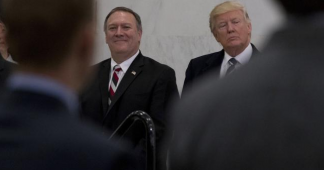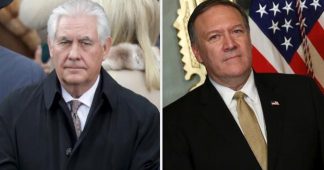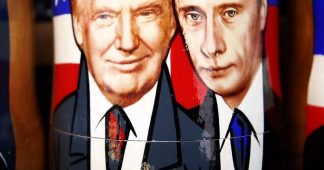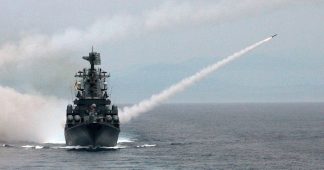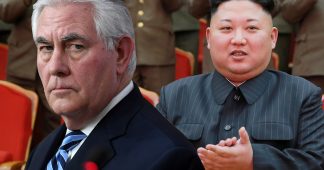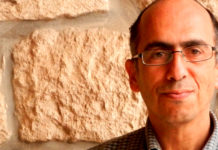By Marcus Day and Kristina Betinis
25 May 2018
The Northwestern University Buffett Institute for Global Studies hosted a roundtable event in the Chicago area on May 23 titled, “The Kremlin’s Global Reach,” moderated by Medill journalism professor and Washington Post veteran Peter Slevin. The panel showcased the institute’s first “Distinguished Visitor,” Strobe Talbott, former deputy secretary of state in the Clinton administration, president of the Brookings Institution think tank from 2002 to 2017, and a key architect of US imperialist strategy in relation to the breakup of the USSR in the 1990s.
Also present were political science professor Jordan Gans-Morse, public opinion pollster Dina Smeltz, lecturer and former US ambassador to Georgia Ian Kelly and historian John Bushnell.
The event took place amid a steady escalation of US militarism against Syria, Iran and Russia. Just two days earlier, Secretary of State Mike Pompeo delivered an ultimatum to Iran demanding a capitulation to the US in the face of additional sanctions. This followed on the heels of the Trump administration’s scrapping of a nuclear agreement reached in 2015 between Iran and the P5+1 group, the US, UK, France, Germany, China and Russia. Earlier this month, the US relaunched a naval force, the Second Fleet, in the North Atlantic in preparation for military confrontation with Russia.
The political perspective of the event was clear from Slevin’s opening questions: “What is to be done? How do you solve a problem like Vladimir Putin?”
Strobe Talbott outlined three main challenges faced by the current Russian government: its internal problems, including economic and demographic decline; the “threat from the Islamic world, it’s the southern belly and it’s very vulnerable;” and finally, potential conflict with China over access to natural resources. “They know Russia has resource wealth and human poverty that could spell trouble down the line,” Talbott said.
To the question, “Do we have another Cold War?” Talbott answered, “Yes, we’ve got a Cold War. It’s the old McCarthy line: If it quacks like a duck, and it walks like a duck, it’s a Cold War.”
In line with this reactionary narrative, Talbott presented the conflict between the US and Russia as one between “democracy” and “tyranny,” while some of the other panelists admitted that is not the way the conflict is viewed in Russia and Europe.
Later, Talbott emphasized the challenge to US hegemony posed by the Balkans, particularly Serbia, citing their cultural and religious affinities with Russia. In 2015, Montenegro entered NATO.
Historian John Bushnell raised only one objection against the panel’s official State Department line. Referring to the 2014 US-German-led coup in Ukraine, he said, “The Russians, I think with some justification, point out that John McCain didn’t need to show up in Kiev. There was no reason for a top State Department official [Victoria Nuland] to be caught giving advice, deciding who would sit in the next Ukrainian cabinet. There clearly was a direct American intervention in Ukrainian politics. ”
A number of the panelists interrupted at this point, some laughing nervously, others strongly protesting.
Slevin, in concluding the discussion, posed the question of regime change in Russia, stating, “How does this end? How does Putin … fall? Retire? Get replaced? What is the fate of Vladimir Putin?”
The main obstacle to regime change in Russia was, according to the panelists, the chaos it would inevitably unleash. Kelly emphasized at different points in the discussion that there is no plan for succession in Russia after Putin. He said, “There really is no succession plan. … And in many ways, that is absolutely terrifying. Because if everything does depend on one man, do we really want to push Russia to the edge with more sanctions, and try and undermine their regime? Because if there is no successor, then you have a similar situation without any kind of management of the transition that we had in ’91, with a country that has thousands of nuclear weapons and chaos.”
However, expressing the position of significant sections of the Democratic Party, aligned with the US state-military-intelligence apparatus, Talbott concluded, “Putin has presided over Russia in a way that is very, very much like the Soviet Union. That didn’t work. This won’t work. He will be an aberration. It would also help if we had a different president in the United States.”
A notable feature of the event was its casual militarism. In introducing himself, Kelly noted that the US has recently provided both Georgia and Ukraine with Javelin anti-tank weaponry.
In line with the propaganda pumped out about the US media and political establishment, the panel speakers presented a picture of reality turned upside down: Russia was presented as an aggressive, expansionist power, and a growing threat to the American way of life. In fact, it is the US government and its imperialist allies which have increasingly encircled Russia via NATO expansion, crippled its economy with sanctions and sought to provoke a military conflict.
As US Defense Secretary James Mattis noted in releasing the Pentagon’s new National Security Strategy, “Great power competition—not terrorism—is now the primary focus of US national security.”
Before the audience assembled by this national security institute, which appeared to include only a handful of undergraduate students, these leading political figures spoke more bluntly about imperialist foreign policy than they would normally do on national television or in supposedly democratic arenas like the US Congress.
The WSWS wrote in 2016 that the establishment of the Buffett Institute at Northwestern—with the assistance of a $101 million donation from Roberta Buffett Elliott, the sister of billionaire Warren Buffett—was part of an international effort of the capitalist elite to transform leading universities into ideological centers of imperialist military strategy.
At the time of the Buffett Institute’s founding, university students and faculty protested the appointment as its head of former the US commander in Afghanistan, Lt. Gen. Karl Eikenberry, whose qualifications were based on military rank and bellicose politics, rather than any academic credentials. Northwestern faculty members charged that he “advocates instrumentalizing the humanities and social sciences research to advance US soft power.”
The International Youth and Students for Social Equality are leading the opposition internationally to the transformation of colleges and universities into think tanks for imperialism and militarism. Contact the Socialist Equality Party to start an IYSSE chapter on your campus.
